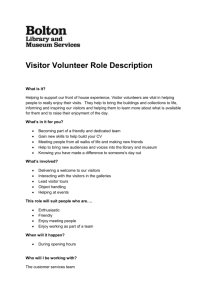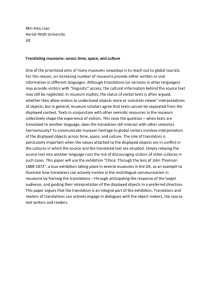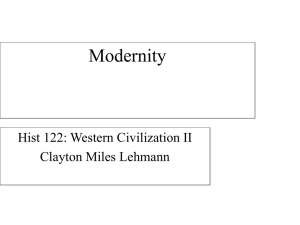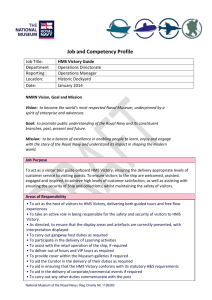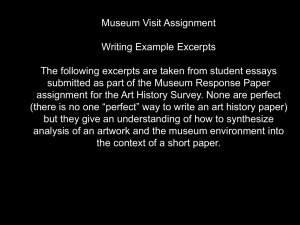Questioning QR Codes In Cultural Education
advertisement
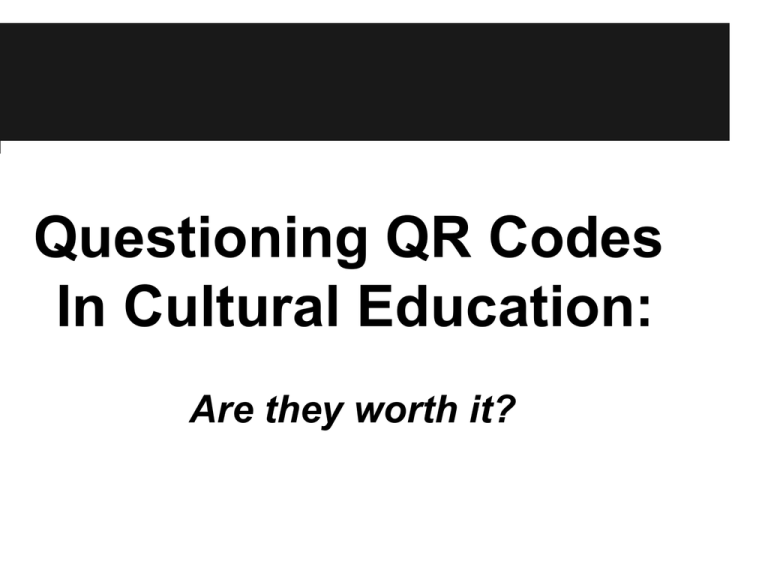
Questioning QR Codes In Cultural Education: Are they worth it? it ? “The idea isn’t to shove technology into places it isn’t needed. The idea is to make sure the right technology, in the right amount, is available, in the right context.” -Sree Sreenivasan, first Chief Digital Officer Metropolitan Museum of Art1 1 Preston, Jennifer So Many Stories to Tell for Met’s Digital Chief. New York Times, October 25: F26. http://www.nytimes.com. Accessed October 28, 2013. Agenda What is a QR code? Applications in Cultural Education User Demographics: Case Study Pros and Cons: Initial Investment Visitor Use Issues of Access Evaluation: Technology Successful Implementation: Case Study Best Practice: Suggestions What is a QR Code? Quick Response Code Barcode that anyone can print and use with a QR Code Reader Provides access to data like webpages Applications in Cultural Education translating exhibits into other languages communicating exhibits digitally interacting with exhibits providing more information and related media evaluating more diverse sample of visitors User Demographics: Case Study from the SI February to July 2011 Gender: 51% male 49% female Age: 39% in 18-34 years old range 48% in 35-54 years old range 13% in 55+ years old range Education: 63% at University or beyond 26% at College/Associate 11% at High School or Other Income: 71% at $50,000+ per year 23% at $25,000-$50,000 per year 6% at >$25,000 per year The average user of the SI QR codes from February to July 2011 was: A university educated man in his mid-30s to early-50s who has an annual household income of $50,000+. Statistics provided by: Smithsonian Web and New Media Strategy Wiki Initial Investment Visitor Use Issues of Access Evaluation:Technology Pros & Cons Initial Investment (+) QR Codes are a low-risk investment. “The amount of energy I put into generating a QR code and then including it in materials was negligible. And the cost was zero, since we were printing the items anyway (i.e. we weren't reprinting anything just to include a QR code).” -Michael Hulslander, Manager of Onsite Learning, National Air and Space Museum 1. They require very little work to implement. 2. They are inexpensive: minimal cost to create, minimal cost to display, as it is usually already covered by the cost to print the main content. Initial Investment (+) QR codes are generally easy to create and display. ex: Smithsonian Folklife Festival 2012 Initial Investment (-) QR Codes are a low-return investment. “We tried using QR codes...Honestly, the uptake was next to nothing. Also, our Educators did put a lot of effort into making the QR codes and putting them on the signs, so in the end it was more effort than it was worth…” 1. Some museums find creating and printing QR codes to be energy intensive. 2. For educators, a low return may negate low risk. They might choose to focus on other tools and projects. Visitor Use (+) QR codes have been used successfully in museums and other cultural learning sites. “For me, the neat thing was that the FIRST response we got to QR codes came from someone in their 80s who LOVED them and took the time to write me a letter to let me know.” -Marsha MacDowell, Curator of Folk Arts, Michigan State University Museum; Professor, Art and Art History Department, Michigan State University 1. Visitors who use QR codes like them. They are a useful tool that has the potential to enhance visitors’ experiences. Michigan State University Museum Visitor Use (-) Most visitors do not use QR codes. “I just wanted to put in a brief word to suggest against using a QR code... People just don't use them, for a variety of reasons--it's tough to scan them, you have to have the right software on your phone and none of the major phones come preloaded with it, you don't know where they're taking you, and it's usually just faster for people to type in a URL.” -Marcella L. Florence, Digital Learning Manager, National Museum of African American History and Culture 1. QR codes are rarely utilized because they are not a standardized technology -no standard code reader program, no standard code Issues of Access (+) QR codes help museums to connect with audiences that prefer to learn through technology. “I am currently using QR codes on a traveling exhibit to access audio relating to the exhibit...It goes without saying that the younger crowd thinks it's cool.” -Anna Fariello, Associate Research Professor, Hunter Library Digital Initiatives, Western Carolina University 1. QR codes may improve museum accessibility for certain age-based demographic groups. (Refer to Statistics on Slide 6) Issues of Access (-) QR codes exclude and “other” visitors who lack access to technology. 1. QR codes make museums less accessible for certain income-based demographic groups. (Refer to Statistics on Slide 6) -Museums must decide which demographic groups need more outreach efforts; focusing on reaching a different age demographic through technology could come at the expense of reaching more diverse income demographic groups through more accessible efforts. Technology (+) QR codes are a cutting-edge technology. “So I wouldn’t rule QR codes out just yet. Seems to me, they’re just taking hold. I can’t predict the future, but if they’re big in Asia, I take that as a good sign that they can be fun, useable, and useful.” -– Kat Forgacs,Owner/Artist, BLISS Gemstones and Jewelry, Owner and Reiki Master/Teacher, BLISS Animal Reiki; Former graduate student in the Folklore Program at IU 1. QR codes are a relevant educational technology. Their popularity in Asia is a positive indicator for their increased use in the U.S. Technology (-) Or, are QR codes already an outdated technology? 1. Cultural education should use technology but make sure it is relevant first. According to some professionals in the tech industry, QR codes may not be relevant anymore. Technology (-) Are QR codes a safe technology? : QR code companies can sue institutions that use their codes and/or readers. : QR Codes are hackable. If a code is hacked, anyone who downloads it onto their device may compromise their personal information. (no standardized code, no standardized protection) Successful Implementation: Case Study “We have had success with one type of QR code. We have made two free standing signs in the Museum. One is our public space, in front of the John Bull locomotive and the other one is within the American Stories exhibition, by Lincoln’s pocket watch. Both ask very engaging questions such as Want to see the John Bull run? Then the QR code is linked to a youtube video…Both signs have been receiving many hits since we first put them out last December. ” - Julia Garcia, Education Specialist, National Museum of American History Successful Implementation: Case Study QR Codes can turn technology from a distraction in the museum setting into a fun, effective tool for engagement. -Lisa Falk, Associate Curator, Education Arizona State Museum Best Practice:Suggestions (For QR Codes) 1. Raise visitor awareness of QR codes. -Direct visitors to download a free code reader beforehand. -Put the codes in visible, chest-height places. -Create colorful, visually interesting sign for the code. -Remind all visitors that the codes are available. -Explain the code as a tool: what is it? -Include step-by-step instructions for how to use the code. Best Practice: Suggestions (For QR Codes) 2. Make using QR codes a rewarding experience. Associate the codes with popular social media: Provide and explain the active content to which the code links, such as audio, games, videos. Best Practice:Suggestions (For QR Codes) 3. Ensure accessibility. If possible, provide: Wifi AND/OR small, portable computers ex: tablets Best Practice: Suggestions (For Other Technologies) Do not use QR codes. Display a short URL instead. 1.USE a direct link to registered domain that clearly indicates the purpose of the site. ex: www.festivalexhibits.com/2013 Visitors will most likely understand that this link is a short URL for festival exhibits in 2013. 2. Be careful with websites like bit.ly or tiny.url ex: www.bit.ly/FEAQR2013 These websites do shorten URLs and redirect users to another site. But the example link above does not clearly state where it is going; make sure visitors are not confused by an unclear URL. Best Practice:Suggestions (For Other Technologies) 1. Do not use QR codes: use Applications, or Apps. Current technology already available on most smartphones Ex:
